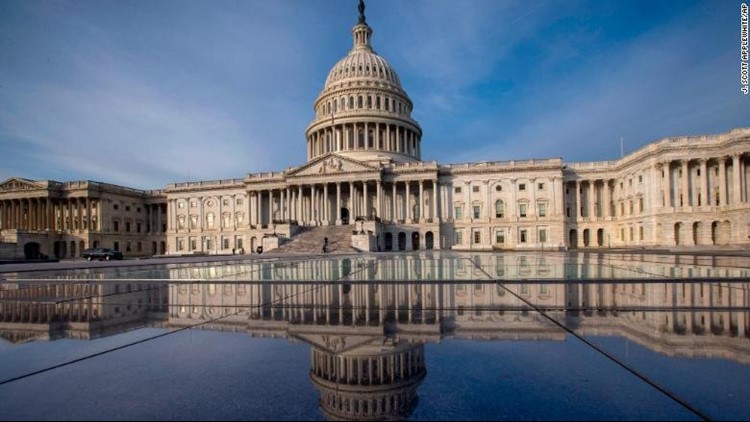WASHINGTON — On the first day of the government shutdown, there’s more sniping about who is to blame than serious progress towards ending it.
The White House and leaders of the Republican and Democratic parties on Capitol Hill dug in for a period of political spinning and blame shifting that will eventually shape the politics of the shutdown and decide who comes out on top.
President Donald Trump had been hoping to be the star of the show at a glitzy fundraiser at his Mar-a-Lago resort in Florida Saturday celebrating the anniversary of his inauguration. But he was forced to stay in Washington after Democrats in the Senate blocked a GOP funding bill, forcing the government to officially close at midnight.
“There shouldn’t be a shutdown, but there is,” Trump said in a video recorded for showing at the event, according to a person who saw the footage. “It’s caused by the Democrats. But we’re gonna end up winning another victory.”
But Democratic Senate leader Chuck Schumer pinned the blame directly on the President, implying that he was falling well short of his “Art of the Deal” reputation and was being led astray by hardline White House aides, Hill Republicans, and conservative media.
“Negotiating with this White House is like negotiating with Jell-O. It is next to impossible,” Schumer told reporters. “The President needs to pull up a chair to end this shutdown.”
Republican Senate Majority leader Mitch McConnell warned “the solution is to end the foolishness. It’s hurting millions of Americans who have done absolutely nothing to deserve this.”
Most of the energy on both sides Saturday was devoted to key players branding the impasse either the “Trump shutdown” or the “Schumer shutdown.” And for all the posturing, sources told CNN that Schumer and McConnell had not spoken since their interactions on the Senate floor in the dramatic early moments of Saturday. A Democratic source said there had been no conversations between the top Democrat and anyone in the White House on Saturday.
Republicans are resolute: no talks on DACA, the expiring Deferred Action for Childhood Arrivals program, until Democrats give them enough votes to reopen the government. Democrats, meanwhile, say they have to have an answer on extending protection to nearly 700,000 people brought to the US illegally as children who face deportation after early March.
“It is kind of hard to understand. When you’re holding our troops hostage and essentially denying services to law-abiding Americans and denying funding to our border agents, how you can negotiate on DACA during that?” Marc Short, the White House legislative affairs director asked. “I think the administration’s position is that as soon as they reopen the government, we’ll resume negotiations on DACA, but it’s hard to negotiate on that while they’re keeping our border agents unpaid, keeping our troops unpaid, and not paying for American services.”
Republicans and Democrats appear caught in a catch-22. One side is demanding talks on immigration before they vote on a short-term spending bill. The other side won’t engage until the government is open.
“There’s not going to be any DACA talks when this government is shutdown,” Arkansas GOP Rep. Steve Womack said Saturday morning. “That’s just unacceptable to the conference and it should be unacceptable to the American people.”
For now, the only possible off ramp is a three-week spending bill that most Democrats don’t appear willing to embrace.
Senate Majority Whip John Cornyn described the proposal as the “sensible thing to do” and also had some choice words for the negotiations Friday night that included a failed procedural vote and left both sides scrambling to make a deal on the floor of the chamber.
“It was, I would say, a little bit of chaos, is how I would describe it,” the Texas Republican said before entering his office Saturday morning
GOP leaders see how much support there is for a three-week extension
Despite Democrats saying they would not accept a 3-week extension to government funding, Republican leaders in Congress — including the House and Senate Majority leaders — are still pushing a plan to funded government through February 8. Democrats want an extension of just a few days, believing that the momentum for negotiations will fizzle over a longer period.
Eleven hours after the government shutdown Friday at midnight, House Majority Leader Kevin McCarthy said his members would accept a three week deal, which is different from the bill the House passed earlier this week, which would keep the government funded until February 16.
“I believe we would accept if they went to February 8,” the California Republican told reporters on Capitol Hill
McConnell, who spoke with Trump on Saturday morning, said Friday night he was open to the proposal.
But Republican support is only half the battle: the Senate needs 60 votes to pass the continuing resolution, and Republicans only control 51 seats.
And Democrats are adamant that they will not allow the bill to proceed until it deals with the issue of DACA, even though most lawmakers on both sides agree on most things in the legislation, including an extension of a children’s health program and most do not want the government to remain closed.
“There is nothing in this bill Democrats say they object to. Yet it’s like a 2-year-old’s temper tantrum to say, I am going to take my toys and go home because I’m upset about something else,” Short said.
Schumer said that he left a meeting with Trump on Friday afternoon hopeful that a deal could be reached after reluctantly suggesting concessions on Trump’s plan for a border wall in return for action on DACA recipients. But he accused the President of walking back on an agreement under pressure from right-wing members of his own administration.
But White House budget director Mick Mulvaney disputed the claim that Schumer’s offer met Trump’s demands
“Mr. Schumer has to up his game and be more honest with the president of the United States if we are going to be seeing progress,” he said.
What’s at stake
The dramatic shutdown marked the finale of a game of chicken that’s been waged for months between Republicans and Democrats. While budget negotiations have worked through a number of sticking points, including domestic vs defense spending caps, children’s health insurance and disaster relief, both sides have dug in deeper over immigration — convinced the other side would blink..
For Republicans, it was essential to isolate immigration as an issue, with the hope of gaining more leverage by dragging it closer to a March deadline on DACA and forcing Democrats to give up their budget negotiating power in fear of the ramifications of a shutdown perceived as just about immigration.
For Democrats, the focus was on keeping immigration as part of the fabric of issues, showing the base it wasn’t an issue that could be jettisoned for convenience and maintaining negotiating leverage.
Both sides were convinced for months their side was the stronger position.
But at the deadline, neither blinked.
Blame game
House Republicans were emphatic: this one isn’t their fault.
“It’s the hashtag Schumer Shutdown. Period,” Rep. Billy Long, a Republican from Missouri.
Still, members were irritated Saturday morning as they gathered for their morning conference meeting. California Republican Darrell Issa described the mood as “not good.”
During a Republican conference meeting, Long told reporters that Rep. Ann Wagner of Missouri told her fellow members about how she had a new 2-day old grandchild she was ready to see and that she was worried about the military not getting their paychecks.
“I think this is extremely irresponsible,” blasted moderate New Jersey Republican Tom MacArthur.
Republicans feel confident that they’re on the right side of the shutdown. While House Republicans were the ones who failed to deliver the votes when the government shut down in 2013. This time around, members say they want their leadership to stand firm against Senate Democrats who they believe will feel the pressure sooner or later.



